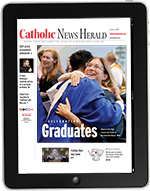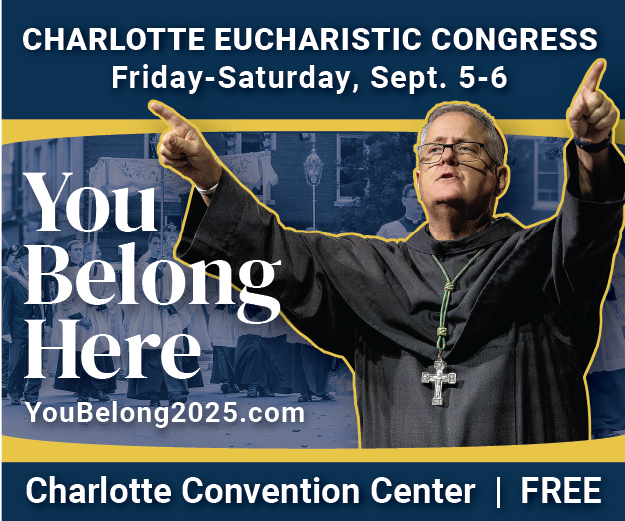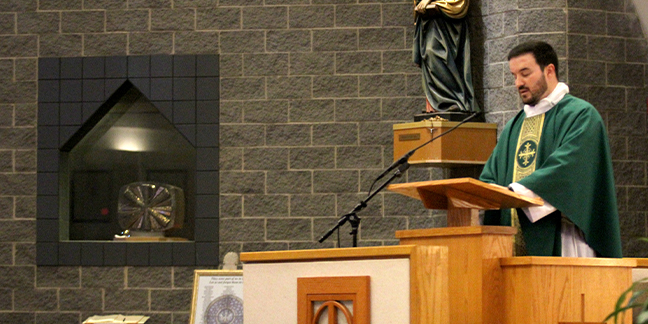 Father Juan Miguel Sanchez reads a special letter to the faithful from Bishop Peter Jugis during the 10:45 a.m. Mass Sunday, Nov. 14, at St. Matthew Church in Charlotte. In his letter, the bishop encourages churches, ministries, schools and other groups to participate in a process of conversation and listening to the Holy Spirit that will lead up to a worldwide Synod of Bishops in 2023. (Photo by SueAnn Howell, Catholic News Herald)
Father Juan Miguel Sanchez reads a special letter to the faithful from Bishop Peter Jugis during the 10:45 a.m. Mass Sunday, Nov. 14, at St. Matthew Church in Charlotte. In his letter, the bishop encourages churches, ministries, schools and other groups to participate in a process of conversation and listening to the Holy Spirit that will lead up to a worldwide Synod of Bishops in 2023. (Photo by SueAnn Howell, Catholic News Herald)
Bishop Jugis: ‘It is my heartfelt desire for the synod to allow us to grow in unity with one another and with the Lord’
CHARLOTTE — In a special message read aloud in every church last Sunday, Bishop Peter Jugis announced how the Diocese of Charlotte will join in the Church’s effort to hear from all of its members and help guide its mission of proclaiming the Gospel of salvation in the third millennium.
The Church’s initiative calls on all Catholics to prayerfully listen to the Holy Spirit and to one another through a mix of local, national and global conversations on the theme “For a Synodal Church: Communion, Participation, and Mission.” The process will conclude with a worldwide synod of bishops that Pope Francis has convened for October 2023.
At Masses Nov. 13-14, clergy read a special “Letter to the Faithful” from Bishop Jugis that announced and described the synod process for the Charlotte diocese. A longer version of the letter is posted on a new webpage for the diocesan synod, online at www.charlottediocese.org/synod2023.
Bishop Jugis reflected in his letter on the synod’s theme of “communion, participation, and mission.”
“The Holy Father wants all of us to reflect prayerfully on these three words to discover their importance in our lives and the life of the Church, to testify to each other the way the Lord is calling us to embody them at the present moment, and to consider the challenges and struggles that we face in living out the Gospel missionary mandate – both individually and as a Church,” the bishop wrote. “Accordingly, I ask all the members of our diocese to use the coming months to consider the following questions: What is your experience of ecclesial communion, mission, and participation in your life? How does the Church help you in living them out? What challenges or struggles are you facing as you try to embody them? What steps is the Holy Spirit suggesting to call us to live our vocation as a pilgrim people that journeys together toward salvation more fully?”
In his letter, Bishop Jugis also underscored the importance of participation.
“The goal is to engage the whole People of God in the synodal process to ‘journey together, in order to experience a Church that receives and lives this gift of unity, and is open to the voice of the Spirit,’” he wrote, quoting from Pope Francis’ address for the opening of the synod on Oct. 9. “I invite you to join me in participating intentionally in the synodal path the Holy Father has called us to, for I am certain it will bear much fruit in the life of our diocese.”
The goal is to involve any Catholic who wants to participate, as well as reaching out to people who no longer practice their faith and to others in the community, the bishop noted.
“I strongly encourage you to take part in these local gatherings that will happen across the diocese,” he wrote. “The goal of the synod, in fact, is not to take surveys and produce documents,” but, as the synod’s Preparatory Document emphasizes, “to foster ‘a lived experience of discernment, participation, and co-responsibility, where a diversity of gifts is brought together for the Church’s mission in the world.’”
Between now and next April 30, Bishop Jugis is inviting all groups in the diocese to hold conversations about the ways they currently experience the Church as a missionary community in which everyone is called to a life of discipleship, and to suggest ways to live such a call more fully.
These groups will include parishes, schools and colleges, auxiliary groups, lay movements, third orders, charitable ministries, religious communities, minority communities, immigrant populations, campus and youth ministries, and more.
Representatives from these different groups will share the fruits of their conversations at a common gathering scheduled for June 11, 2022, at St. Patrick Cathedral in Charlotte.
A summary or “synthesis” of the diocesan-level synod will be sent to the U.S. Conference of Catholic Bishops by June 30, 2022. The USCCB will then send a synthesis of all the U.S. dioceses’ work to the Vatican.
'I ask all the members of our diocese to use the coming months to consider the following questions: What is your experience of ecclesial communion, mission, and participation in your life? How does the Church help you in living them out? What challenges or struggles are you facing as you try to embody them? What steps is the Holy Spirit suggesting to call us to live our vocation as a pilgrim people that journeys together toward salvation more fully?' — Bishop Peter J. Jugis
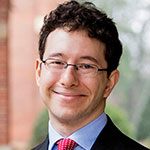 Steering the local effort is Dr. Alessandro Rovati, who has been appointed by Bishop Jugis to serve as the official contact person for the diocesan phase of the synod.
Steering the local effort is Dr. Alessandro Rovati, who has been appointed by Bishop Jugis to serve as the official contact person for the diocesan phase of the synod.
Rovati is department chair and assistant professor of theology at Belmont Abbey College. He is a graduate of the Università Cattolica del Sacro Cuore in Milan and a published author with leadership roles in national theological associations. His areas of expertise include moral theology and Catholic social teaching. He has already served the Charlotte diocese by teaching classes for St. Joseph College Seminary and by delivering lectures and workshops to youth, laity, clergy, catechists and teachers.
“I am humbled by the bishop’s request to assist him in the organization of the Synod’s diocesan phase,” Rovati said. “I became a theologian to serve the Church and its people, so this opportunity is a dream come true.”
In coming months, Rovati will be contacting and responding to diocesan groups and others to help them organize local gatherings. He also will facilitate the diocese’s common gathering next June.
Rovati noted that while there will be a way to send individual reflections and contributions, people are encouraged to participate in the local gatherings around the diocese to have a chance to be with one another in dialogue and prayer.
“Encountering one another in prayerful conversation will give us a chance to discover what the Lord is doing in our lives and the further steps to which He is calling us, both individually and as a Church,” he said. “The synod is an extraordinary opportunity to grow together in our faith. I cannot wait to travel around the diocese to talk and pray with people.”
In concluding his letter to the faithful, Bishop Jugis encouraged people to pray for the success of the synod – particularly in deepening people’s “devotion to the Lord’s Presence in the Sacrament of the Eucharist” and in listening to the presence of the Holy Spirit “in our midst and the many ways in which the Holy Spirit is calling us to conversion.”
“It is my heartfelt desire for the synod to allow us to grow in unity with one another and with the Lord,” he wrote. “To this end, I ask you to keep our diocesan journey in your prayers.”
— Patricia L. Guilfoyle, editor. Catholic News Service contributed.
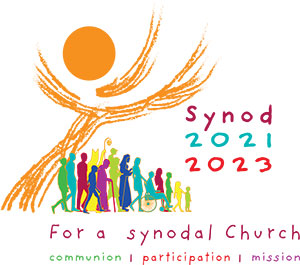
For more information
- At charlottediocese.org/synod2023: Find resources from the Vatican and the USCCB, including Pope Francis’ messages, downloadable prayer cards, and communication resources for your parish or ministry, as well as keep up with the latest synod news
- For inquiries about the diocesan synod process, email This email address is being protected from spambots. You need JavaScript enabled to view it..



